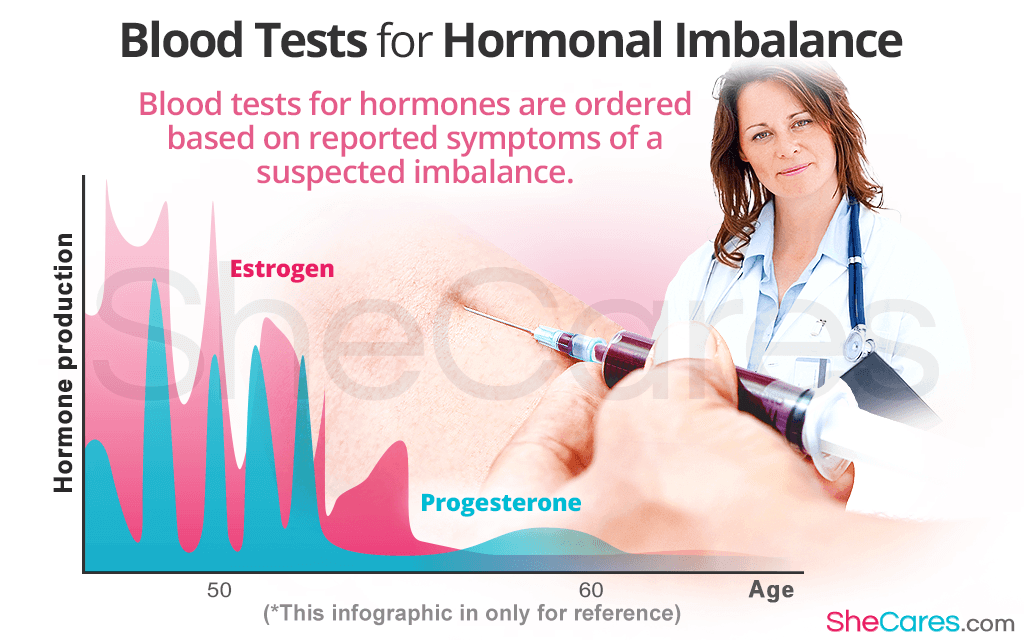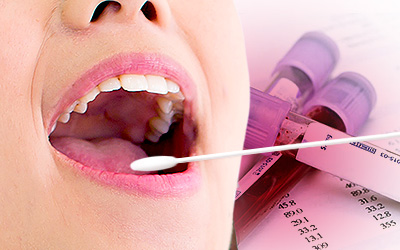While hormonal fluctuations are an integral part of being a woman and usually do not require medical interventions, sometimes women's hormones get thrown out of whack enough to lead to distressing physical and emotional symptoms, necessitating proper evaluation, such as a blood test for hormones.
Keep reading to learn more about hormone imbalance blood tests, including when a woman might need one and what types of lab tests for hormonal imbalance she can choose from for optimal health and equilibrium.
What are Hormone Blood Tests Used for?
Most commonly, a lab test for hormonal imbalance is ordered based on reported symptoms, including hot flashes, irregular periods, infertility, or loss of libido, among others.
These symptoms that might require hormonal blood work are generally indicative of various conditions, such as polycystic ovarian syndrome (PCOS), thyroid disease, diabetes, obesity, and more.
When Do I Need Hormonal Blood Work?
Since blood tests for hormones are not a part of routine blood tests that might be done at an annual check-up, women are recommended to report any persistent, severe, or alarming symptoms to their doctors to be properly evaluated with a blood test and other diagnostic hormone tests, if necessary.
During pregnancy, on the other hand, hormonal blood work will be ordered at specific points throughout gestation or when additional needs as part of adequate prenatal care.
Types of Hormone Imbalance Blood Tests
Depending on the reported symptoms and a woman's medical history, the following are the most common types of lab tests for hormonal imbalance that might be ordered to obtain a full diagnosis of the underlying cause:
For Reproductive Hormones
While an imbalance of reproductive hormones can happen at any time during a woman's life, the stages most characteristic of it include puberty, pregnancy, and menopause. Moreover, when a woman has irregular periods, trouble getting pregnant, or PCOS, a blood test could check for an imbalance of the following hormones:1
- DHEA-Sulfate
- Follicle-stimulating hormone (FSH)
- Luteinizing hormone (LH)
For Thyroid Hormones
A thyroid panel or thyroid function test can be used to diagnose thyroid disorders, like hypo- or hyperthyroidism; Hashimoto's or Graves' disease; and thyroid nodules. This type of hormone imbalance blood test might check for the levels of the following hormones:2
- Thyroid-stimulating hormones (TSH)
- Triiodothyronine (T3)
- Thyroxine (T4)
- T3 resin uptake
For Other Hormones
Although the aforementioned blood tests to diagnose hormonal imbalance in women are the most common ones, there are others that might also be ordered to pinpoint the underlying cause behind imbalance symptoms. They include:
- Insulin hormones for hypoglycemia, insulin resistance, or type 2 diabetes3
- Cortisol hormone for adrenal disorders, like Cushing's syndrome or Addison disease4
- Anti-Müllerian hormone for infertility, PCOS, or early menopause5
- Prolactin hormone for prolactinoma, infertility, or irregular periods6
Blood Hormone Test Results
A blood test for hormones will produce exact levels of tested hormones in a woman's blood as well as the normal reference range for those specific hormones, both of which will be analyzed by a licensed medical doctor to confirm or rule out a hormonal imbalance.
Because hormone levels fluctuate on a regular basis, each of the 200 identified hormones and hormone-like substances has its own normal accepted range (mainly depending on a woman's age and reproductive status) as well as the best time of the month to test for it.
Conclusions
Blood tests for female hormonal imbalance are important diagnostic tools that can be used to either confirm that a woman is indeed passing through periods of reproductive significance, like menopause, or that she is suffering from hormonal imbalance that is independent of natural life stages. Regardless of the root cause, women can tackle their symptoms by taking advantage of a number of effective treatments of hormonal imbalance, which range from safe lifestyle changes and effective alternative medicine to more risky pharmaceutical options. With a little effort, hormonal equilibrium is just a step away!
Sources
- American Association for Clinical Chemistry. (2019). DHEAS. Retrieved October 21, 2019 from https://labtestsonline.org/tests/dheas
- Medline Plus. (2019). Estrogen Levels Test. Retrieved October 21, 2019 from https://medlineplus.gov/lab-tests/estrogen-levels-test/
- Medline Plus. (2019). Follicle-Stimulating Hormone (FSH) Levels Test. Retrieved October 21, 2019 from https://medlineplus.gov/lab-tests/follicle-stimulating-hormone-fsh-levels-test/
- Medline Plus. (2019). Hormone Levels. Retrieved October 21, 2019 from https://medlineplus.gov/ency/article/003445.htm
Footnotes:
- Society of Endocrinology. (n.d.). Hormones in human reproduction. Retrieved October 21, 2019 from https://www.yourhormones.info/students/topics/hormones-in-human-reproduction/
- National Institute of Diabetes and Digestive and Kidney Diseases. (2017). Thyroid Tests. Retrieved October 21, 2019 from https://www.niddk.nih.gov/health-information/diagnostic-tests/thyroid
- Medline Plus. (2019). Insulin in Blood. Retrieved October 21, 2019 from https://medlineplus.gov/lab-tests/insulin-in-blood/
- Medline Plus. (2019). Cortisol Test. Retrieved October 21, 2019 from https://medlineplus.gov/lab-tests/cortisol-test/
- Medline Plus. (2019). Anti-Müllerian Hormone Test. Retrieved October 21, 2019 from https://medlineplus.gov/lab-tests/anti-mullerian-hormone-test/
- Medline Plus. (2019). Prolactin Levels. Retrieved October 21, 2019 from https://medlineplus.gov/lab-tests/prolactin-levels/


